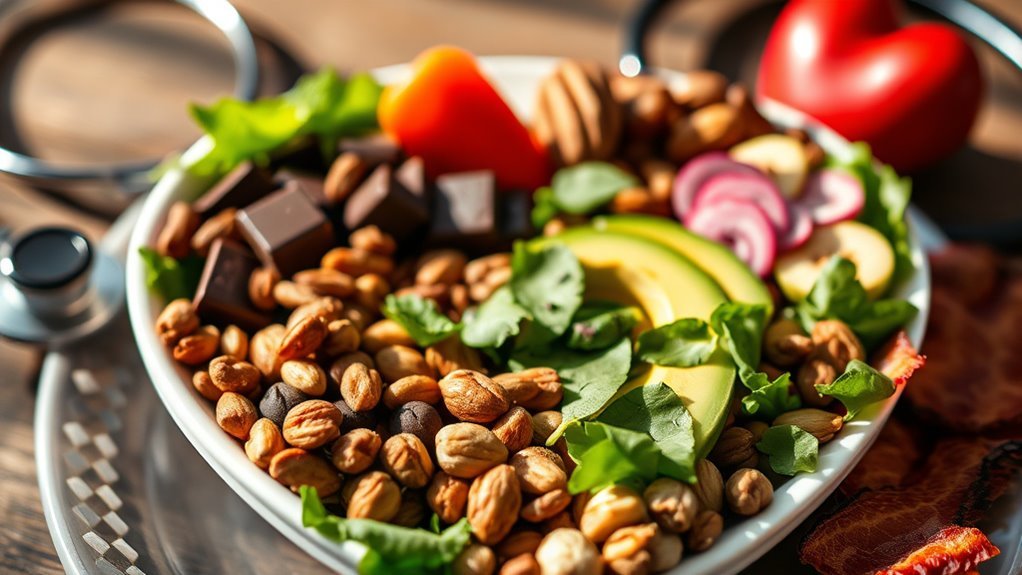The keto diet can impact your heart health differently based on your food choices. While it promotes fat as an energy source, high saturated fat intake might raise LDL cholesterol levels, which could lead to heart issues. However, it can also increase protective HDL cholesterol. It’s important to reflect on the types of fats and carbohydrates you consume, as they play a significant role in heart health. For more insights on balancing the keto diet, keep exploring.
Understanding the Keto Diet: Basics and Principles

When you consider the keto diet, it’s essential to grasp its fundamental principles and how it works. At its core, the keto diet emphasizes low carbohydrate intake, which prompts your body to enter a state of ketosis. This metabolic state allows fat to become your primary energy source instead of carbs. Understanding keto principles involves recognizing that diet variations exist, such as standard, targeted, or cyclical keto, each catering to different lifestyles or goals. While some may find success in weight loss or increased energy, it’s vital to assess how these changes affect your overall health. Always consult with a healthcare professional to tailor the approach to your individual needs, ensuring freedom in your choices while prioritizing well-being.
The Impact of Saturated Fats on Heart Health

While the relationship between saturated fats and heart health has sparked considerable debate, understanding this connection is vital for anyone contemplating the keto diet. Research indicates that saturated fat effects on heart health can vary. Some studies suggest that high saturated fat intake may contribute to heart disease, while others argue it might not be as harmful as once thought. It’s essential to evaluate your overall diet and lifestyle. For instance, sources of saturated fats like coconut oil and dairy may impact your health differently than processed meats. Ultimately, the heart disease connection isn’t solely about saturated fats; it also involves factors like overall food quality and balance. Staying informed will empower you to make choices that align with your health goals.
Cholesterol Levels and the Keto Diet: What You Need to Know

Understanding how cholesterol levels are influenced by the keto diet is vital for anyone considering this eating plan. On the keto diet, you may increase your intake of saturated fats, which can raise levels of LDL cholesterol, often referred to as “bad” cholesterol. However, it’s also possible to boost HDL cholesterol, known as “good” cholesterol, which helps protect against heart disease. The balance between these cholesterol types is significant; while some may experience elevated LDL levels, others might see an improvement in their overall cholesterol profile. It’s essential to monitor your cholesterol regularly and consult a healthcare professional to determine how the keto diet affects your heart health specifically. Knowledge and awareness empower you to make informed dietary choices.
The Role of Carbohydrates in Cardiovascular Health
Although many people view carbohydrates as detrimental to heart health, they play a complex role in cardiovascular well-being. The type of carbohydrates you consume matters greatly. Whole grains, fruits, and vegetables are rich in fiber, which can lower cholesterol levels and improve heart health. Fiber intake is vital, as it promotes healthy digestion and helps regulate blood sugar levels, reducing the risk of heart disease. In contrast, refined carbohydrates found in sugary snacks and white bread can lead to inflammation and other cardiovascular issues. Balancing carbohydrate types in your diet is essential for maintaining a healthy heart. Embracing a variety of whole foods can empower you to make choices that support your cardiovascular health without sacrificing enjoyment or freedom in your meals.
Potential Risks of the Keto Diet for Heart Disease
As you explore the keto diet, it’s important to contemplate its potential risks for heart disease. Many keto misconceptions suggest that high-fat consumption is always beneficial, but this isn’t universally true. Research indicates that a diet high in saturated fats may elevate LDL cholesterol levels, increasing heart disease risk.
| Risk Factor | Explanation | Considerations |
|---|---|---|
| Saturated Fats | Can raise LDL cholesterol | Choose healthier fats |
| Nutrient Deficiency | Limited food choices may lead to gaps | Supplementation may be necessary |
| Increased Blood Pressure | High sodium intake from processed foods | Monitor sodium levels |
| Weight Gain | Overeating fats can lead to excess | Portion control is key |
| Reduced Fiber Intake | Low fruits and veggies | Aim to include fiber sources |
Understanding these risks can help you make informed decisions about your heart health.
Balancing the Keto Diet: Tips for Heart Health
To maintain heart health while on the keto diet, it’s essential to focus on healthy fat sources like avocados, nuts, and olive oil. Regularly monitoring your cholesterol levels can help you adjust your diet as needed to minimize any potential risks. Balancing these aspects can guarantee you’re reaping the benefits of keto without compromising your heart.
Healthy Fat Sources
A well-rounded keto diet hinges on choosing healthy fat sources that not only support weight loss but also promote heart health. Incorporating olive oil is a great start, as it’s rich in monounsaturated fats that can lower bad cholesterol levels. Don’t forget the avocado benefits; they’re packed with healthy fats and fiber, making them a perfect keto-friendly choice. Explore various nut varieties like almonds and walnuts, which provide essential nutrients and heart-healthy fats. Finally, consider adding chia seeds to your meals; they’re a fantastic source of omega-3 fatty acids and fiber. By selecting these healthy fats, you can enjoy the freedom of a keto lifestyle while supporting your heart health.
Monitor Cholesterol Levels
While enjoying healthy fats on a keto diet, it’s important to keep an eye on your cholesterol levels. Regular cholesterol monitoring can provide valuable insights into your heart health, especially as you indulge in high-fat foods. Some studies suggest that for certain individuals, a keto diet may raise LDL cholesterol, which is linked to heart disease. However, it can also boost HDL cholesterol, known as the “good” cholesterol. To achieve a balanced approach, consider incorporating fiber-rich vegetables and lean proteins to support heart health. Regular check-ups with your healthcare provider can help you assess your cholesterol levels and make necessary adjustments. Remember, staying informed empowers you to enjoy the freedom of the keto lifestyle while prioritizing your heart health.


